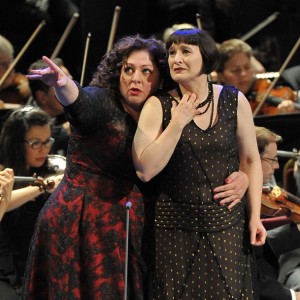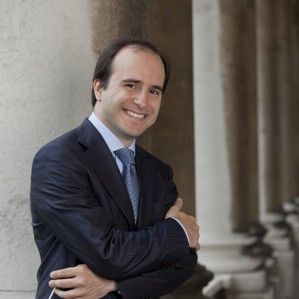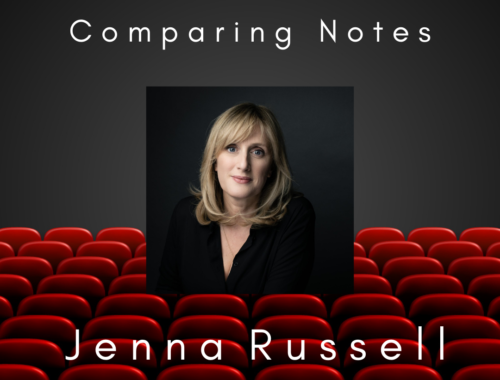Prom 59, “Elektra”, BBC Symphony Orchestra, Bychkov, Royal Albert Hall
 How much familial dysfunction and lust – whether for sexual gratification or revenge – can one take in a single weekend? Salome and Elektra back-to back may on paper seem like a feast of divine decadence but no sooner had one become accustomed to the sickly sweet air of the former when the putrefaction of the latter (I always think that Strauss’ orchestra is in the final stages of decay with Elektra) filled one’s nostrils – and ears. Then there was the little matter of inevitable comparisons, of Salome – with Steeme, Runnicles and his fabulous Deutsche Oper Berlin Orchestra – being one of the best live performances of the piece it has ever been my good fortune to hear. Follow that? Not even close.
How much familial dysfunction and lust – whether for sexual gratification or revenge – can one take in a single weekend? Salome and Elektra back-to back may on paper seem like a feast of divine decadence but no sooner had one become accustomed to the sickly sweet air of the former when the putrefaction of the latter (I always think that Strauss’ orchestra is in the final stages of decay with Elektra) filled one’s nostrils – and ears. Then there was the little matter of inevitable comparisons, of Salome – with Steeme, Runnicles and his fabulous Deutsche Oper Berlin Orchestra – being one of the best live performances of the piece it has ever been my good fortune to hear. Follow that? Not even close.
When Semyon Bychkov conducted Elektra at Covent Garden some years back I don’t remember it feeling so heavy, so deliberate, so slow. It could be that removed from the theatre and with an orchestra – the BBC Symphony – less familiar with the piece than their counterparts at the Royal Opera House that an element of caution, of safety first, pervaded this performance. Of course, the BBC Symphony play unfamiliar repertoire all the time and the playing was certainly of a quality, occasionally blazing to life in climactic releases and more notably that sombre portent of revenge in Wagner tubas and trombones when Orestes effectively comes back from the dead. But the unfamiliarity was still apparent to me; there wasn’t that bedrock of security in the playing. And when it came to a scene like the baiting of Aegisthus with its pre-Rosenkavalier parody of waltzy titillation the joke didn’t land on account that the schmaltz wasn’t well and truly under the fingers of the fiddle players. More worrying still was a lack of inner-tension and dramatic momentum so that when the great Recognition Scene finally arrived it seemed to come from nowhere.
For certain it wasn’t moving as it surely must be and is – not because of the Orestes (Johan Reuter brought a still, quiet dignity – almost ghostly – to the role) but because the Elektra, the much-lauded Christine Goerke, didn’t sing a single phrase below mezzo-forte. Nor did the words come from within, or indeed off the page. Without the text in front of me they all blurred into a kind of one-colour-fits-all generality. Goerke’s middle voice is big and exciting and at the start of her monologue the invocation to “Agamemnon! Father!” resonated with wonderful gravitas from the sound alone. But as the voice moves into the upper quadrant – especially with those top Bs and Cs – it narrows and loses its quality and girth. Goerke is now the darling of the New York Met – and judging by her delirious reception here at the Proms – and it’s a fact that everybody thrills to big and loud, but since her appearance in the role at the Royal Opera House last year more wear and tear is plainly evident. If you sing these roles like this, they take their toll.
Gun-Brit Barkmin as sister Chrysothemis doesn’t have that kind of vocal equipment – indeed in this hall she was really over-parted in the role – but from her I did get the text and the longing and the yearning for a life not yet lived – and though the singing wasn’t pretty and somewhat pushed in her big moments it really came from somewhere. Too bad that she and her sister were subjected to such silly and inappropriate prancing in their short-lived moment of triumph.
The evening, though, did deliver one masterclass in vivid text and electrifying (sorry) vocal characterisation – and that was Felicity Palmer’s seasoned and scarifying Clytemnestra. Every moment of her great scene – von Homannsthal’s libretto at its purplest and richest – was her recurrent nightmare relived, the words rattling and rasping to blood-curdling effect. As she asks the question “Can one then perish while still alive, like a rotting carcass?” she is, in this performance, effectively answering it.
But would that every scene had had the accumulative power of that one. Elektra should be gripping from first note to last; but this performance relied on its climaxes and much too much screaming to pummel us into submission. Too much hot air, not enough of its dark soul.
Image: Christine Goerke as Electra and Gun-Brit Barkmin as Chrysothemis in Elektra at the BBC Proms 2014. Copyrigh/Credit: BBC/Chris ChristodoulouYou May Also Like

A Conversation With GIANLUCA MARCIANO: Italian style and traditions
15/10/2013
COMPARING NOTES: Jenna Russell in conversation
08/12/2020

3 Comments
David Pattrick
I didn’t hear Goerke like that. When I closed my eyes, it was the closest to the sound made by the much- missed Rita Hunter that I’ve ever heard – absolutely gleaming in its power. But you are so right about the wonderful Felicity Palmer.
Incidentally, do you know why a lot of the violinists were using two instruments?
Edward
I have no idea why the violins were using two instruments, David – but I suspect it might be a tuning issue given the length and stress of the piece.
Rita Hunter had much more focus and body at the top than Goerke has at the present time. But an inability to sing quietly at the top is a sure sign of problems ahead. I hope I’m wrong but with the Met lining her up for Brünnhilde the pressure on her is not going to lessen. Compare the condition of her voice now with Steeme after all her Brünnhildes and Isoldes – still able to project wonderful pianissimi in her revelatory performance of Salome.
Edward
Ok, David, I now have the answer to the extra violins. Strauss uses a slightly reduced violin section but an augmented viola section divided into six parts. But in the finale scene of the opera more violins are required – hence the violists having a second instrument.